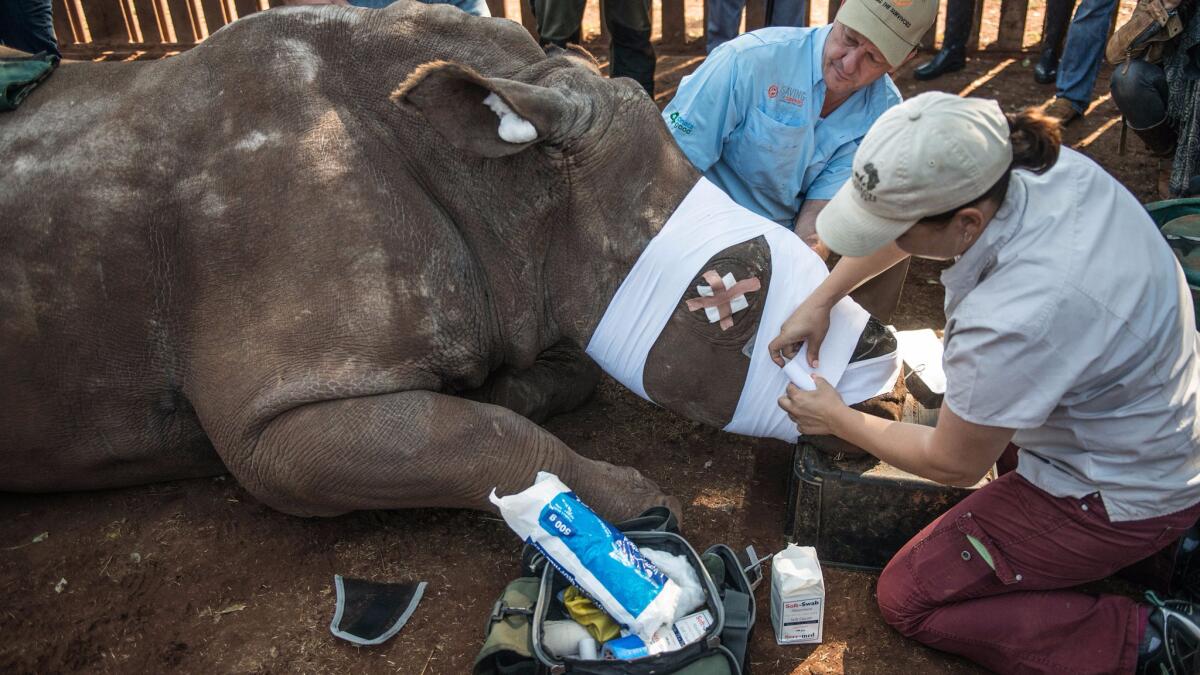Some of the people who are supposed to be saving rhinos are helping them die out

They are supposed to save the rhino — police in Mozambique, South African soldiers, park rangers and government officials.
But the people who could help stop the species’ extinction are often making things worse, according to a report Wednesday that laid out a series of damning failures of governance and law enforcement.
The problem is part corruption, part incompetence and partly the petty refusal of neighboring governments to cooperate, as rhinos face ruthless, highly organized international syndicates, according to the report by the Global Initiative Against Transnational Organized Crime, an analytical group.
Diplomats or government delegations from North Korea, Vietnam and China have abused their diplomatic status to traffic rhino horn, according to the report. Rhino horn, consisting of keratin and similar to horses’ hooves, is valued in parts of Asia as a premium, status-conferring medicinal substance. Chinese citizens accused in major smuggling operations have been arrested, but granted bail in southern African courts and simply disappeared.
“The upshot: Unless something changes – drastically – the fight against poaching is “an unwinnable war,” according to the report.
“Again and again … efforts to target syndicates in multiple jurisdictions are hamstrung by corruption, incompetence, governments that are unwilling or incapable of acting, a lack of information-sharing, petty jealousies and approaches to tackling crime that wrongly emphasize arrests and seizures over targeted investigations and convictions as a barometer of success,” the report, “Beyond Borders,” found.
Rhino poaching has soared across southern Africa in recent years, with South Africa’s largest national park, the iconic Kruger National Park at the epicenter. Earlier this week, the transnational group warned that unless more effective action is taken, the park’s population could plummet from around 9,000 at present to a few thousand within two years.
Mozambique, with a weak justice system and deeply entrenched corruption – and which neighbors Kruger National Park – is a major part of the problem, according to the group.
“Chinese and Vietnamese criminal networks have become ever more deeply entrenched in Mozambique, secure in the knowledge that being caught smuggling ivory, rhino horn or any other wildlife product can usually be resolved by paying a fine or a bribe. Since the beginning of the current rhino poaching crisis, no Vietnamese or Chinese nationals arrested in connection with smuggling rhino horn or ivory has been jailed,” the report said.
The crisis was harshly illustrated in May of last year: Mozambican police raided a house occupied by two Chinese nationals and seized the biggest haul of poached rhino horn and ivory in the country’s history: 340 tusks and 65 horns weighing 1.6 tons. One of the men offered police a $34,000 bribe, but both were arrested.
At first.
The suspects were released on bail to appear in court in November and haven’t been seen since. A dozen of the seized horns were stolen from police custody, and four police were among the six men arrested over the theft.
The seizure came just days after Mozambican police stopped Pak Chol-jun, a North Korean diplomat based in South Africa, who was traveling in the Mozambican capital, Maputo, in a car carrying about 100,000 in cash and 10 pounds of rhino horn.
“Next to the ambassador, he was North Korea’s most senior representative in southern Africa. It was his second stint at the embassy. His passenger, Kim Jong-su, was a taekwondo master and, according to diplomatic and government sources, a suspected North Korean spy whose cover was teaching martial arts students in South Africa and Mozambique,” the Wednesday report found.
The North Korean ambassador to South Africa, Yong Man-ho, flew in and within hours the men had paid $30,000 and had been released. Kim left South Africa in November and Pak departed in December.
In 2006, Vietnamese diplomats in South Africa were accused by police of smuggling rhino horn. Between 2008 and 2010 Chinese diplomats in South Africa were arrested for being in possession banned wildlife products. But neither was prosecuted.
In Zimbabwe, according to the report, there is evidence of involvement by officers of the country’s Central Intelligence Organization in poaching and smuggling. In South Africa, soldiers, national park rangers and vets have been arrested for involvement in the illegal rhino horn trade.
“If this investigation has revealed anything,” the group said, “it is the complexity of the challenges facing those trying to protect the rhino and other African wildlife from virulent and versatile professional criminal networks. As our two reports show, we are a long way from being able to meaningfully disrupt transnational criminal networks, and reaching a point where we can protect key species in not just southern Africa but around the world. Their future is becoming increasingly uncertain.”
ALSO
South Sudan appears to be sliding back into war
South Korean official faces wrath after saying 99% of his countrymen are ‘like dogs and pigs’
No matter how it decides, international court’s ruling in South China Sea case won’t end the fight
More to Read
Start your day right
Sign up for Essential California for news, features and recommendations from the L.A. Times and beyond in your inbox six days a week.
You may occasionally receive promotional content from the Los Angeles Times.






